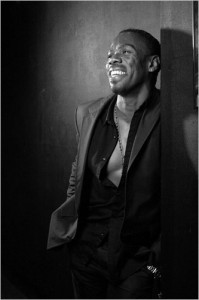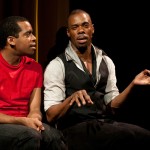Preview: A Boy and His Soul
Tony Award nominee Colman Domingo says he wrote his latest one-man play A Boy and His Soul to enlighten audiences about the complexity of the African-American existence – from the perspective of being an openly gay man growing up in West Philly. Not only did Domingo win an Obie for his performance during its run at the Vineyard Theatre, but he’s also been seen in a slew of New York productions in recent years – and to great acclaim.
LGBT audiences may also recognize Domingo from The Big Gay Sketch Show (he’s channeled Maya Angelou reading from the man-for-man personals on Craig’s List). But this latest show is particularly personal for the actor and writer.
“I can add voices from our community,” says the GLAAD Media Award winner. “We, as African-American men, are so narrowly portrayed on stage and TV, and it’s important for myself and other African-American artists to tell these stories.”
The Brothers’ Network, a Philadelphia-based racial justice nonprofit, is producing Domingo’s play in Philly this month (Oct. 16) at the Society Hill Playhouse. The play delves into the complex intersections of race, gender, class and sexuality.
“I choose to tell the stories that I tell because I find that every time I see African-American male characters, they’re distilled and absorbed into stereotypes,” says Domingo. “They’re oversexualized, or they’re gangsters, or they’ve become caricatures of [Bill] Cosby, the ‘New Negro.’”
And even though he no longer lives in Philly, Domingo says that as both a playwright and actor, he often looks back on his past in West Philly for inspiration. “Growing up in a working-class community taught me a lot about how to survive,” he says, as he takes on a full cast of characters in A Boy and His Soul. He’s won critical acclaim for the show, and for his roles in both Passing Strange and The Scottsboro Boys.
Domingo crosses both sexual and gender boundaries by portraying his sister Avery, one of the 11 different characters in the play. He describes her as “a compilation of many different women – West Philly ghetto princesses with a lot of attitude, a lot of heart, and a lot of sass,” he says. “I wanted to give her character a place on stage so they wouldn’t be marginalized, to see what makes them tick.”
He also portrays his blue-collar stepfather Clarence, his mother, a homemaker, and himself from age six until today. “I thought it was important to portray a family like the one I grew up in that was surrounded by so much love. I think that is surprising in the portrayal of an inner-city black family,” he says, explaining that music becomes a common thread for many of the characters. “One of the messages delivered in soul music is faith in life, in how you find your way. …I am interested in my protagonists being African-American gay males – but fully fleshed out, so we can see a full human being, not someone who is there for comic relief or who is over-sexualized.”
A Boy and His Soul, Oct. 16, 8 p.m., Red Room of the Society Hill Playhouse, 507 S. Eighth St. (a portion of ticket sales benefit HRC), 215-923-0210.




